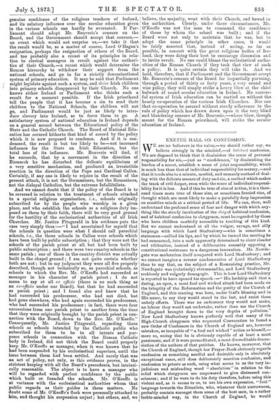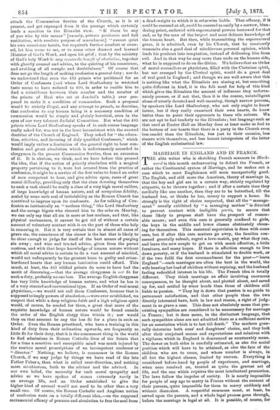EXETER HALL ON CONFESSION.
E are no believers in the value,—we should rather say, we believe strongly in the mischief,—of habitual confession. We are disposed to think that it diminishes the sense of personal responsibility for sin,—just as "confidences," by diminishing the burden of a secret, establish a sense of joint responsibility, which is much less than that of individual responsibility for secrecy,—and that it tends also to a minute, morbid, and unmanly method of deal- ing with the delicate essence of duty and sin, a method which makes the track of evil deeper, even while the sense of individual responsi- bility for it is less. And if this be true of sins of action, it is a thou- sand times more true of those sins, or sometimes fancied sins, of thought which are most likely to make a painfully deep impression on sensitive minds at a critical period of life. We can, then, well understand the profound sense of fear and danger with which any- thing like the steady inculcation of the duty of habitual confession, and of habitual confession to clergymen, must be regarded by those who have children morbidly accessible to teaching of this kind. But we cannot understand at all the vulgar, savage, and silly language with which Lord Shaftesbury—who is sometimes a statesman—sullied his lips, and by which he turned the meeting he had summoned, into a mob apparently determined to cheer slander and vilification, instead of a deliberative assembly opposing a constitutional resistance to a dangerous innovation. Mr. Newde- gate was moderation itself compared with Lord Shaftesbury ; and we cannot imagine a severer condemnation of Lord Shaftesbury than to say that, on the subject of a Romanising practice, Mr. Newdegate was (relatively) statesmanlike, and Lord Shaftesbury recklessly and vulgarly demagogic. This is how Lord Shaftesbury is reported to have opened his speech :—" His lordship said that a daring, an open, a most foul and wicked attack had been made on the integrity of the Reformation and the purity of the Church of England, and this meeting was here, under God's blessing and in His name, to say they would stand to the last, and resist these unholy efforts. There was no endeavour they would not make, no labour they would not undertake, rather than see the Church of England brought down to the very depths of pollution." Now Lord Shaftesbury knows perfectly well that many of the High-Church clergymen who requested Convocation to found a new Order of Confessors in the Church of England are, however mistaken, as incapable of " a foul and wicked" action as himself,— more so, seeing that be is obviously capable of at least a most passionate, and if it were premeditated, a most discreditable denun- ciation of the authors of that petition. He knows, moreover, that the Church of England, though her Prayer-Book obviously regards confession as something needful and desirable only in absolutely exceptional cases, still does deliberately sanction confession, and confession to priests as such, using what seems to us the very in- judicious and misleading word " absolution " in relation to the relief which clergymen are empowered to give distressed con- sciences; and if he were to do his duty therefore, before using this violent and, as it seems to us, to use his own expression, " foul " language towards the Ritualists, who, whatever their narrowness, probably contain amongst them some of the best men, in a rather feeble-minded way, in the Church of England, be would attack the Communion Service of the Church, as it is at present, and get expunged from it the passage which certainly lends a sanction to the Ritualist view. "If there be any of you who by this means" [namely, private penitence and full restitution, with resolute purpose of amendment] "cannot quiet his own conscience herein, but requireth further comfort or coun- sel, let him come to me, or to some other discreet and learned Minister of God's Word, and open his grief ; that by the ministry of God's holy Word he may receive the benefit of absolution, together with ghostly counsel and advice, to the quieting of his conscience, and avoiding of all scruple and doubtfulness." Of course that does not go the length of making confession a general duty ; nor do we understand that even the 483 priests who petitioned for an Order of Confessors (and whom Lord Shaftesbury in wretched taste seems to have reduced to 400, in order to enable him to find a coincidence between their number and the number of the priests of Baal who sat at Jezebel's table,) ever pro- posed to make it a condition of communion. Such a proposal would be strictly illegal, and any attempt to preach, as doctrine, that confession to any human being is a necessary condition of communion would be simply and plainly heretical, even in the eyes of our very tolerant Judicial Committee. But what the 483 priests whom Lord Shaftesbury speaks of in such coarse language really asked for, was not in the least inconsistent with the avowed doctrine of the Church of England. They asked for "the educa- tion, selection, and licensing of duly qualified Confessors," which would imply rather a limitation of the general right to hear con- fession and grant absolution which is unfortunately accorded to clergymen in the present Communion Service, than an extension of it. It is obvious, we think, and we have before this pressed the idea, that if the notion of priestly absolution with a magical property pertaining to it, were but severed from the practice of confession, it might be a service of the first value to found an order of men competent to hear, and give advice upon, cases of great moral difficulty, providing only that the class devoting themselves to such a task should be really a class of a very high moral calibre, of large knowledge of human nature, and of scrupulous fidelity, sealed by some such seal of inviolability as the Roman Church has contrived to impress upon its confessors. As for talking of Con- fesaion as intrinsically an "unclean thing," like Lord Shaftesbury and the savage bigots who cheered him to the echo on Monday, we can only say that all sin is more or less unclean, and that, like physical uncleanness, it cannot be got rid of without a certain amount of voluntary contact with it on the part of those who help in removing it. But it is very certain that in almost all cases of grave sin, the conscience of the sinner ia the last that is likely to be clear enough to judge for itself of the best means of purging sin away ; and wise and trusted advice, given from the purest motives, and with that large knowledge of human nature without which all moral advice is certain to do a vast amount of mischief, would not unfrequently be the greatest boon to guilty and crime- burdened hearts that any human institution could afford. This much, at least, the 483 vilified priests do seem to have had the merit of discerning,—that the average clergyman is not fit for such a duty, probably no one less. The average English clergyman has very little knowledge of human nature, and what he has is of a very stunted and conventional type. If an Order of real moral physicians,—we would not call them Confessors, because that is supposed to imply powers of absolution,—were ever established, we suspect that while a deep religious faith and a high religious spirit would, of course, be needed for them, a great deal more of the requisite knowledge of human nature would be found outside the order of the English clergy than within it ; nor would they on that account be any the less fit for a place in such an Order. Even the Roman priesthood, who have a training in this kind of duty from their ordination upwards, are frequently so little fit for their duty, that it is the commonest thing in the world to find admissions in Roman Catholic lives of the Saints that for a time a sensitive and susceptible mind was much injured by the routine moral prescriptions of an incompetent confessor or "director." Nothing, we believe, is commoner in the Roman Church, if we may judge by things we have read of the late Father Faber s, than what is called over-direction, and nothing more mischievous, both to the adviser and the advised. In our own belief, the necessity for such moral sympathy and advice as we have spoken of comes extremely rarely in an average life, and an Order established to give the higher kind of counsel would not need to be other than a very small one. Of course, the Roman Catholic and Anglican notion of confession rests on a totally different idea,—on the supposed sacramental efficacy of penance and absolution to free the soul from
a dead-weight to which it is otherwise liable. That efficacy, if it I could be ensured at all, could be ensured as easily by a narrow, blun- dering priest, endowed with supernatural powers bestowed for that end, as by the man of the largest and most delicate knowledge of the human heart. But then, while transmitting the supernatural grace, it is admitted, even by his Church, that he constantly transmits also a good deal of mischievous personal opinion, which leads his penitent into temptation, instead of delivering him from evil. And in that way he may more than undo on the human side, what he is supposed to do on the divine. We believe that an Order of moral counsellors or physicians, filled with the Christian spirit, but not cramped by the Clerical spirit, would do a great deal of real good in England ; and though we are well aware that this is nothing like what the Ritualists are aiming at, but something quite different in kind, it is the felt need for help of this kind which gives the Ritualists the amount of influence they unfortu- nately possess, or if not that, then it is the coarse, unintelligent abuse of utterly devoted and well-meaning, though narrow persons, by speakers like Lord Shaftesbury, who not only ought to know better, but if they really examined their own hearts, do know better than to paint their opponents in these vile colours. We are not apt to feel tenderly to the Ritualists ; but language such as that used at Exeter Hall on Monday does at least make us feel to the bottom of our hearts that there is a party in the Church even less candid than the Ritualists, leas just to their enemies, less sincere with themselves, and less honest interpreters of the letter of the English ecclesiastical law.



































 Previous page
Previous page